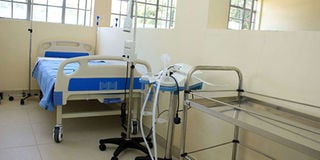Covid-19 ‘tests Kenya’s health system’

An isolation room at Mbagathi Hospital in Nairobi. PHOTO | FILE | NATION MEDIA GROUP
What you need to know:
Experts say country can only mitigate potential explosive spread of virus through early interventions
- Besides a lack of running tap water, Kenya and other African countries have weak health infrastructure.
The pathogen is so infectious “we need to do everything we can to slow down its spread. If we don’t, we’ll overwhelm our health system.”
Kenya’s ability and resolve to fight the new coronavirus was put to the test as soon as the country confirmed its first case.
Experts believe the country can only mitigate a potential explosive spread of Covid-19 through early interventions.
“The rest of the world bought Africa enough time to prepare for the virus. We have had time to learn more about it and even educate healthcare professionals as well as the public. Now, the true test is to see what we did with that time,” Dr Marianne Mureithi, a medical microbiologist, said.
When the first case was confirmed on March 12, the government sprang into action and laid out a raft of measures like cancelling group events or closing public spaces to fight the pandemic.
Some county governments went ahead to shut down restaurants and nightclubs.
Further, Kenyans have been advised to properly wash their hands with soap and water. In the absence of water, experts are advocating use of alcohol-based sanitisers.
“The test is flattening the exponential curve so that the spread of the virus can be slowed down. If the curve is not flattened, then the health system will be overwhelmed,” said Dr Mureithi, who is the acting chairperson of the Department of Medical Microbiology at the University of Nairobi.
Epidemiologists term the concept of slowing the spread of a disease ''flattening the curve''.
“People really need to listen and follow prevention strategies given to them. On the other hand, public health officers ought to continuously repeat these messages by educating the public,” Dr Mureithi said.
But in a country where the World Health Organisation (WHO) and Unicef estimate that 59 per cent of people have access to basic water services and the little that is available is rationed, how will the public maintain the needed hygiene?
“The cheapest prevention and hygiene method is hand washing,” the university don advised. If you have no access to water, you should use a sanitiser. “I think it’s time county governments stopped rationing water in urban centres.”
Globally, the number of affected countries hit 143 as coronavirus deaths passed 6,500. WHO daily Situation Reports show that as of Tuesday, there were 153,517 confirmed cases.
Besides a lack of running tap water, Kenya and other African countries have weak health infrastructure.
Two months ago, WHO Director-General Tedros Adhanom Ghebreyesus said his “biggest concern” was Covid-19 spreading in countries with weak health systems.
Dr Mureithi said the pathogen is so infectious “we need to do everything we can to slow down its spread. If we don’t, we’ll overwhelm our health system.”
There are fears that the virus may take a great toll on countries with weak health systems and a population disproportionately affected by HIV, tuberculosis and other infectious diseases.
We’re all at risk
“We really have no idea how Covid-19 will behave here. However, going by what is happening in the West, we’re all at risk. Today, the cases are just four, and the system can handle them,” Dr Mureithi said. What if they were 10? she asked.
To slow the Covid-19 spread, experts are calling for ''social distancing'', a public health practice that aims to prevent sick people from coming into close contact with healthy people — a challenge in overcrowded cities and slums.
Hand shaking, hugging and kissing should also be avoided, while people arriving from affected countries should self-quarantine for 14 days.





